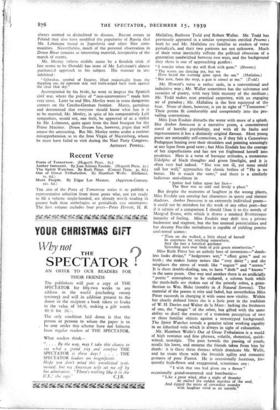Left Wings—They Never Grow Weary
DURING the year or two preceding the outbreak of war the one conclusion upon which all were in agreement was that Europe was in a mess. In different tones of voice these two books discuss the outward appearance of certain aspects of the continent's unhealthy condition during that period ; and Mr. Lehmann enters into a detailed examination of the under- lying cause of the trouble in relation to the former empire of Austria-Hungary. Mr. Mosley, less serious in manner, de- scribes his visits to Spain, Nuremberg, Czecho-Slovakia, Danzig, and other storm-centres, when these were in the news.
The thesis of Mr. Lehmann's book is that until the pro- blem of the Danubian States is solved there will never be peace in Europe, because these States are economically dependent upon each other, while the inevitable difficulties of a hotch- potch of races are complicated by the traditional enmity be- tween Teuton and Slay. The old Austrian Empire went some way to provide a solution ; now that it gone another/ con- federation must be formed. How is this to be done? For Mr. Lehmann the answer is Communism ; and his histbrical and political résumé of the events that led up to the absorption of Austria into Greater Germany points to the Soviet as the desirable anatomist of the Gordian Knot.
Mr. Lehmann has evidently taken considerable pains with his subject. He is informative, earnest, well-meaning, some- times a little sentimental, and occasionally repetitive ; but having set out on the difficult literary task of compressing a number of events of greatly varying importance into a com- paratively small space, he is undeterred by statistics and the minutiae of party manoeuvring. There are, in fact, moments when he becomes more than a little prosy, though a book of this sort may be expected to make demands on the reader's attention. The quality that he does not show to the fullest advantage is that one, often a meretricious gift, but so necessary to a political writer, of imparting a conviction that the author possesses a grasp of realities. Thus " the U.S.S.R.," " the workers," " Democracy," " the peasants," " Communism," " the more intelligent," all crop up as if they were inter- changeable terms. But if Russia was a democracy, and not totalitarian, the whole burden of Mr. Lehmann's argument that she might solve these difficult questions would fall to the ground, because she would be unable to apply what Mr. Lehmann, speaking of the establishment of collective farms, calls " much costly trial and error," by which, no doubt, he means the famine of 1933, a subject that Intourist guides
always seemed so disinclined to discuss. Recent events in Poland may also have modified the popularity of Russia that Mr. Lehmann found in Jugoslavia and other Slav com- munities. Nevertheless, much of the personal observation in Down River remains as interesting material, irrespective of the march of events.
Mr. Mosley (whose middle name by a fiendish trick of fate seems to be Oswald) has none of Mr. Lehmann's almost puritanical approach to his subject. His manner in un- inhibited : " Gibraltar, symbol of Empire, lifted majestically from the dappling sea, its concrete side and knife-edged back stark against the clear blue sky."
Accompanied by his bride, he went to inspect the Spanish civil war, where the policy of "non-intervention" made him very cross. Later he and Mrs. Mosley were in some dangerous corners on the Czecho-German frontier. Matey, garrulous and determined that everyone should know what fun it is to be married, Mr. Mosley, in spite of his comparatively Left sympathies, would not, one feels, be approved of as a stylist by Mr. Lehmann, quite apart from the final bouquet for the Prime Minister. Down Stream has, however, pages that will amuse the unexacting. But Mr. Mosley seems under a curious misapprehension as to the Iron Virgin of Nuremberg, whom he must have failed to visit during the Nazi Party Congress.
ANTHONY POWELL.









































 Previous page
Previous page